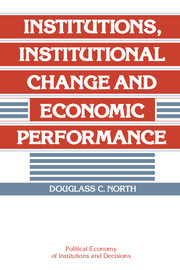Crossref Citations
This Book has been
cited by the following publications. This list is generated based on data provided by Crossref.
López Castellano, Fernando
1970.
Instituciones y subdesarrollo: a vueltas con la divergencia.
Iberian Journal of the History of Economic Thought,
Vol. 3,
Issue. 2,
p.
106.
García Quero, Fernando
and
López Castellano, Fernando
1970.
La economía política institucional: balance y perspectivas.
Iberian Journal of the History of Economic Thought,
Vol. 3,
Issue. 2,
p.
188.
Rutten, Andrew
1990.
The Economic Thought of Karl Polanyi: Lives and Livelihood, J. R. Stanfield. New York: St. Martin's Press, 1986, x + 162 pages..
Economics and Philosophy,
Vol. 6,
Issue. 1,
p.
157.
Ensminger, Jean
1990.
Co‐Opting the Elders: The Political Economy of State Incorporation in Africa.
American Anthropologist,
Vol. 92,
Issue. 3,
p.
662.
ENSMINGER, JEAN
and
RUTTEN, ANDREW
1991.
the political economy of changing property rights: dismantling a pastoral commons.
American Ethnologist,
Vol. 18,
Issue. 4,
p.
683.
Isaac, R. Mark
Mathieu, Deborah
and
Zajac, Edward E.
1991.
Institutional framing and perceptions of fairness.
Constitutional Political Economy,
Vol. 2,
Issue. 3,
p.
329.
Czada, Roland
1991.
Regieren in der Bundesrepublik III.
p.
151.
Levi, Margaret
1991.
Are there limits to rationality?.
European Journal of Sociology,
Vol. 32,
Issue. 1,
p.
130.
Fogel, Robert William
1992.
PROBLEMS IN MODELING COMPLEX DYNAMIC INTERACTIONS: THE POLITICAL REALIGNMENT OF THE 1850s*.
Economics & Politics,
Vol. 4,
Issue. 3,
p.
215.
Schmid, A. Allan
1992.
Legal Foundations of the Market: Implications for the Formerly Socialist Countries of Eastern Europe and Africa.
Journal of Economic Issues,
Vol. 26,
Issue. 3,
p.
707.
Sjöstrand, Sven-Erik
1992.
On the Rationale behind “Irrational” Institutions.
Journal of Economic Issues,
Vol. 26,
Issue. 4,
p.
1007.
Pedersen, Ove K.
Andersen, Niels Å.
and
Kjaer, Peter
1992.
Private Policies and the Autonomy of Enterprise: Danish Local and National Industrial Policy.
Journal of Economic Issues,
Vol. 26,
Issue. 4,
p.
1117.
Almond, Gabriel A.
Flanagan, Scott C.
and
Mundt, Robert J.
1992.
Crisis, Choice, and Changein Retrospect.
Government and Opposition,
Vol. 27,
Issue. 3,
p.
345.
Nayar, Baldev Raj
1992.
The politics of economic restructuring in India: The paradox of state strength and policy weakness.
The Journal of Commonwealth & Comparative Politics,
Vol. 30,
Issue. 2,
p.
145.
Spender, J.‐C.
1992.
Limits to learning from the west: How western management advice may prove limited in Eastern Europe.
The International Executive,
Vol. 34,
Issue. 5,
p.
389.
Nooteboom, Bart
1992.
Towards a dynamic theory of transactions.
Journal of Evolutionary Economics,
Vol. 2,
Issue. 4,
p.
281.
Syll, Lars Pålsson
1992.
Notes on neoinstitutional economics.
Scandinavian Economic History Review,
Vol. 40,
Issue. 2,
p.
21.
Hesse, Günter
1992.
Land use systems and property rights.
Journal of Evolutionary Economics,
Vol. 2,
Issue. 3,
p.
195.
Brautigam, Deborah
1992.
Governance, economy, and foreign aid.
Studies In Comparative International Development,
Vol. 27,
Issue. 3,
p.
3.
Adams, John
1992.
Economic Change in Italy in the Fourteenth Century: The Case of Siena.
Journal of Economic Issues,
Vol. 26,
Issue. 1,
p.
125.



